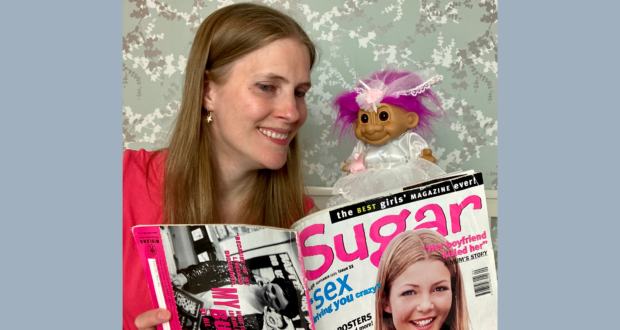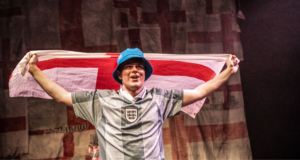A funny and poignant look at the pain of modern love and life that’s crying out for even more ‘90s nostalgia. Summary
Rating
Good
In some ways, the 1990s was not a stellar decade. None of the ground-breaking developments of the ‘60s or counterculture of the ‘70s and missing the political and social awareness that’s becoming the hallmark of the times we’re living through now. As Rachel E. Thorn’s Lovefool proves, the ‘90s might not have been the ‘girl power’ decade the Spice Girls led us to believe but it still makes for happy hunting ground for nostalgic theatre makers.
As Ace of Base and The Cardigans fade away the audience finds Rachel back at her Mum’s house, surrounded by cardboard boxes stuffed full of well-thumbed copies of Sugar magazine and GCSE textbooks. With Rachel’s marriage in such deep crisis they can’t agree on who gets the toothpaste, it’s clear help is needed. What if the dating tips of the mags gathering dust behind her could provide the answers?
What’s presented as a quirky and irreverent play, stuffed full of nostalgia, is quickly revealed to be something slightly different: a poignant and touching monologue about the pain of modern love. With the help of troll dolls playing the men in her life and a piggy bank playing her Mother, Rachel explores some powerful issues; gender inequality in fertility treatment, parental expectation and settling for something safe and second best.
Although, spoiler alert, those teen personality quizzes turn out not to be the solution to contemporary conundrums, however they do lift the show itself. There’s something incredibly powerful about seeing the glossy pages of the magazines projected onto a large screen behind Rachel. Double page spreads of ‘pulling’ tips are presented alongside headlines like ‘my boyfriend gave me HIV’.
There’s no doubting Lovefool perfectly treads that fine line between tragedy and comedy. The audience are laughing out loud one minute about the relationship between ball bearings and sex, then brought to tears the next with a searingly honest take on motherhood. However, when the screen is blank, the stark staging is exposed. The show is crying out for an injection of ‘90s colour and atmosphere: posters, more props, Impulse body spray in the auditorium.
The moments of juxtaposition between nostalgia and present-day reality are brilliant but too few and far-between. Blasts of a poppy soundtrack between the vignettes would have made the heartbreak even more powerful.
The final destination of Rachel’s journey through the self-help manuals of the ‘90s is not much of a surprise. However, it still feels a privilege to be there for the bittersweet and intensely personal moments along the way. There are some brilliant theatrical ideas in Lovefool, but they never quite feel fully realised or part of a cohesive whole.
Written by Rachel E. Thorn
Directed by Claire Dean
Lovefool played as part of Sale Waterside’s Refract Festival for one performance only. It will also be playing at Edinburgh Fringe Festival from 18 – 28 August.
 Everything Theatre Reviews, interviews and news for theatre lovers, London and beyond
Everything Theatre Reviews, interviews and news for theatre lovers, London and beyond



